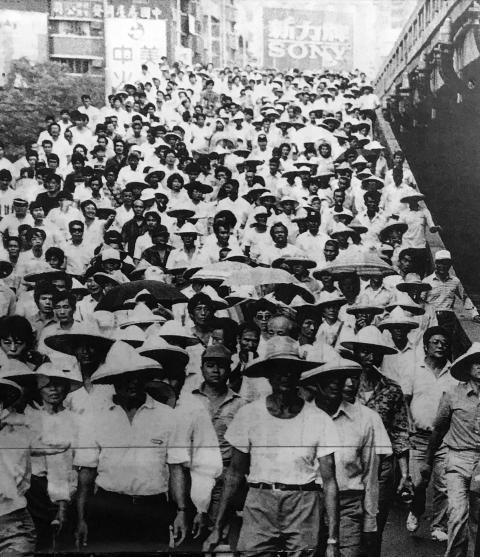May 22 to May 28
Chien Chi (簡吉), the “professional peasant revolutionary” featured in last week’s column, was not meant to live a complacent life. In 1947, he was in trouble again for organizing a resistance army to fight Chinese Nationalist Party (KMT) troops during the suppression of the 228 Incident. He went into hiding and worked as a Chinese Communist Party agent until he was caught and executed in 1951.
There would only be a handful of minor and regional farmer protests over the following several decades under the KMT’s reign of White Terror, where dissidents like Chien faced dire consequences. Early land reforms largely eliminated the landowner system, which boosted production but also allowed the state to directly control the farmers. Wu Yen-chang writes in The Formation and Development of Taiwan’s Farmers’ Movement (台灣農民運動的形成與發展) that farmers were organized under state-funded farmers associations, which “operated according to the benefit of the country instead of the agriculture industry and individual farmers.”

Photo: Huang Shu-li, Taipei Times
DISCONTENT BOILS OVER
Martial law would not be lifted until 1987, but as state control loosened, various social movements took shape in the early 1980s, championing issues ranging from pollution to women’s rights to student government elections. Wu writes that these activities encouraged the farmers to speak out as well. He adds that non-KMT politicians, such as Chu Kao-cheng (朱高正), often sought to broaden their voting base by taking up farmers’ issues.
Taiwan’s farmers were hit hard by natural disasters in 1986, which Wu writes was the worst in more than two decades. To make matters worse, farmers began noticing that their fruit prices were plummeting. In an interview with Reading Taiwan magazine, (重現台灣史) opposition politician Lin Feng-hsi (林豐喜) says that nobody could figure out why until they saw that fruit stands were selling mostly imported fruit.

Photo: Lin Kuo-hsien, Taipei Times
Under Lin’s lead, more than 3,000 farmers gathered in front of the Legislative Yuan on Dec. 8, 1987 to protest the increase in imports. The government put together a task force and met with the farmers, where they presented their requests. Five months later, about 500 people rode their farming vehicles on the streets of Taipei during trade talks between the US and Taiwan, protesting the proposed importing of turkey meat. Lin put together a call for farmers insurance as well.
DRAWING BLOOD
Lin says that he was against taking to the streets so on May 20, 1988, but other activists went ahead with the plan. Spearheaded by the Yunlin Farmers Association (雲林農權會) and future legislators Lin Kuo-hua (林國華) and Hsiao Yu-chen (蕭裕珍), thousands of farmers from across the country met in front of Taipei’s Sun Yat-sen Memorial Hall in the morning. Their demands included universal insurance for farmers, reduced taxes on fertilizer, free trade of farmland and reform to farmers associations.
According to a Reading Taiwan article on the event, trouble started when the marchers reached the Legislative Yuan. Some protesters attempted to enter the building to use the restroom but were turned away by the police. Tensions rose and people started throwing cans and rocks at the authorities, who responded by arresting three protesters. Lin Kuo-hua charged the building in a rescue attempt, and was knocked unconscious and sent to the hospital. The situation worsened, and the Legislative Yuan’s sign was torn down before the angry protesters turned their attention to other government agencies. Clashes continued throughout the day as riot police arrived with barricades and water trucks, while protesters smashed the National Police Agency sign and burned cars. Gas bombs were also thrown.
Lin Kuo-hua and Hsiao were arrested around 7pm. By this time, many farmers had left, but the ranks were bolstered by angry civilians and peaceful students. The chaos continued into the night as riot police lost patience and charged the protesters, who responded with more violence and destruction. Things did not calm down until the morning. It was the most severe incident between civilians and authorities since the 228 Incident.
More than 100 people were hospitalized and 92 faced criminal charges. There was much debate on whether the violence was premeditated, as the police claimed to have found a whole truckload of rocks hidden under vegetables. Only 13 people were acquitted while Lin, Hsiao and other organizers received the heaviest sentences of nearly three years.
AFTERMATH
An investigation into the incident by Academia Sinica scholar Hsu Mu-chu (許木柱) concluded that the protesters did attack first, but also denounced the riot police for exacerbating the situation. Hsu also declared that the violence was not premeditated but a result of emotions running high on both sides.
The two Lins have conflicting opinions on the effects of this incident, both recorded in Reading Taiwan.
“If the 520 Incident hadn’t happened, there were many other farmer issues I had planned to tackle. But I noticed that most farmers became reluctant to protest. The momentum we gained after our Dec. 8 efforts was completely erased. The large-scale peasant movement that rose again after 60 years of silence was abruptly aborted,” says Lin Feng-hsi.
“I believe that the 520 incident helped the farmers greatly,” Lin Kuo-hua says. “The government started taking farmer’s rights seriously and sped up its policy reform. Our demands were eventually met, and I believe that farmers will agree with me that 520 yielded positive results.”
Taiwan in Time, a column about Taiwan’s history that is published every Sunday, spotlights important or interesting events around the nation that have anniversaries this week.

On April 26, The Lancet published a letter from two doctors at Taichung-based China Medical University Hospital (CMUH) warning that “Taiwan’s Health Care System is on the Brink of Collapse.” The authors said that “Years of policy inaction and mismanagement of resources have led to the National Health Insurance system operating under unsustainable conditions.” The pushback was immediate. Errors in the paper were quickly identified and publicized, to discredit the authors (the hospital apologized). CNA reported that CMUH said the letter described Taiwan in 2021 as having 62 nurses per 10,000 people, when the correct number was 78 nurses per 10,000

As we live longer, our risk of cognitive impairment is increasing. How can we delay the onset of symptoms? Do we have to give up every indulgence or can small changes make a difference? We asked neurologists for tips on how to keep our brains healthy for life. TAKE CARE OF YOUR HEALTH “All of the sensible things that apply to bodily health apply to brain health,” says Suzanne O’Sullivan, a consultant in neurology at the National Hospital for Neurology and Neurosurgery in London, and the author of The Age of Diagnosis. “When you’re 20, you can get away with absolute

May 5 to May 11 What started out as friction between Taiwanese students at Taichung First High School and a Japanese head cook escalated dramatically over the first two weeks of May 1927. It began on April 30 when the cook’s wife knew that lotus starch used in that night’s dinner had rat feces in it, but failed to inform staff until the meal was already prepared. The students believed that her silence was intentional, and filed a complaint. The school’s Japanese administrators sided with the cook’s family, dismissing the students as troublemakers and clamping down on their freedoms — with

As Donald Trump’s executive order in March led to the shuttering of Voice of America (VOA) — the global broadcaster whose roots date back to the fight against Nazi propaganda — he quickly attracted support from figures not used to aligning themselves with any US administration. Trump had ordered the US Agency for Global Media, the federal agency that funds VOA and other groups promoting independent journalism overseas, to be “eliminated to the maximum extent consistent with applicable law.” The decision suddenly halted programming in 49 languages to more than 425 million people. In Moscow, Margarita Simonyan, the hardline editor-in-chief of the